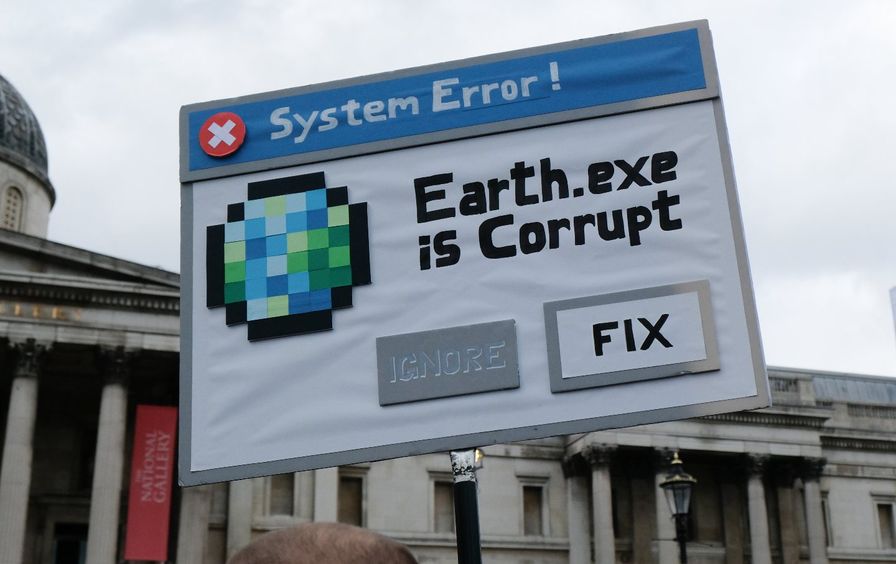
Christiana Figueres wants to thank Donald Trump. She’s the one who, more than any other person, drove the process that led to the Paris Climate Agreement, as executive secretary for the UN Framework Convention on Climate Change. Now she’s confident the pact’s aggressive carbon-reduction goals will be met, she said at a lunch panel hosted by Bloomberg at the World Economic Forum in Davos in late January.
And surprise – she largely credits Trump. “Every time we see some inexplicable attack on someone or some idea, it leads others to double down,” she said. As a result, nations, cities, and citizens around the world are working harder to reduce carbon emissions, she says.
Optimism about our ability to beat back climate change was my big takeaway from Davos. But I also got a sense there that for at least some in business, fighting climate change and working to improve the planet was finally becoming not just a hollow “responsibility.”
“Decarbonizing is a business opportunity,” said Johan Rockstrom, of the Potsdam Institute for Climate Impact Research, also on the lunch program. He was not the only one making that point. At the lunch, B¨ørje Eckholm, CEO of Ericsson, said digital technologies, especially the enhanced internet of things made possible by 5G wireless infrastructure, will assist humankind in meeting fully 1/3 of the climate goals for 2030.
“The business community is way ahead of the political leadership,” climate expert Rockstrom continued. “We are doubling renewable energy produced by solar and wind every 4.5 years. That’s exponential, and means 50% of the world’s energy will be produced from renewable sources by 2030, even with business as usual.”
That same evening, I went to a reception hosted by Unilever’s departing CEO, Paul Polman. As much as any big business leader, he has made a conscious commitment to global betterment a central element of doing business. The reception, attended by hundreds of his friends and fans, was focused on how business can help achieve the UN’s 17 Sustainable Development Goals for 2030.
Like Rockstrom, Polman sees working towards the goals not as a burden for business, but as an opportunity, along with an obligation. He said 1800 CEOs have already committed to integrating the SDGs into their companies’ work, and that achieving them would create at least 380 million jobs.
Our theme here at Techonomy in 2019 is Collaborating for Responsible Growth, so I was heartened to hear Polman call for companies to stop talking about corporate social responsibility, and instead begin pursuing “responsible social collaborations.” Working across boundaries between industries and between business, civil society, and government is the only path to addressing the scale of the world’s problems.
My final day in Davos, I attended the annual lunch hosted by Salesforce CEO Marc Benioff in a giant white geodesic dome in the center of town. This year the lunch, too, was focused on combatting climate change. Benioff moderated a panel including Figueres, the primatologist and conservationist Jane Goodall, Will.i.am, Bono, and Kengo Sakurada, CEO of Japanese insurance company Sompo Holdings.
In his inimitable earnest fashion, Benioff asked the panelists a very non-corporate question: “How can we bring our light into the next five years? Look into your heart.” Figueres proclaimed “This is the moment of choice on climate, and on everything.” Goodall said business must ask how it can perform for the good of the planet. Will.i.am, much of whose focus these days is on entrepreneurship around AI and speech, said we need to pair our efforts at creating smarter machines with parallel efforts to insure people are better educated. Bono was in fine form, as if composing lyrics: “We have to decide if we’re firefighters or arsonists…Businesses, like species, will become extinct if they don’t evolve to changing environments… Consumers are waking up to the power they have in their pockets. They realize it’s political power.”
The idea that consumers are voting as much with their wallets as in the ballot booth was a nice corollary, or even an explanation, for Rockstrom’s point that business is ahead of politicians on climate change.
But the coup de grace was delivered by a 16-year-old climate activist named Greta Thunberg. Benioff, presumably knowing what he was doing, handed her the mike. What we heard was not typical Davos fare. Thunberg quietly thundered: “Some people say that the climate crisis is something that we all have created, but that is not true, because if everyone is guilty then no one is to blame. And someone is to blame. Some people, some companies, some decision-makers in particular, have known exactly what priceless values they have been sacrificing, to continue making unimaginable amounts of money. And I think many of you here today belong to that group of people.” Facing that accusation, the audience first gasped, then applauded. “The future is in your hands,” Thunberg proclaimed in conclusion. Former Trump economic advisor Gary Cohn, sitting in my line of sight, who had been fidgeting and focusing on his phone during most of the panel, did not applaud.
That night, at a dinner in a restaurant back room hosted by my friend Matthew Bishop, the author who is now a managing director at the Rockefeller Foundation, a debate broke out among the assembled journalists, activists, and businesspeople. Several said the World Economic Forum was just a bunch of plutocrats scheming to maintain their wealth. Yes, partly, it is, as Thunberg had pointedly noted. But there were also plenty of more productive threads to this tapestry, I insisted. I left Davos inspired to help continue those at our own Techonomy conferences in 2019. Join us May 14-15 in New York to hear some of those same voices, which I am more determined than ever to assemble here
My Trump-Era Davos Takeaways: Optimism on UN & Climate
The reports may have made it sound grim, but my takeaway from Davos was optimism about beating back climate change. And the idea that business can make money while doing good for the planet and society is a more and more mainstream idea.
















